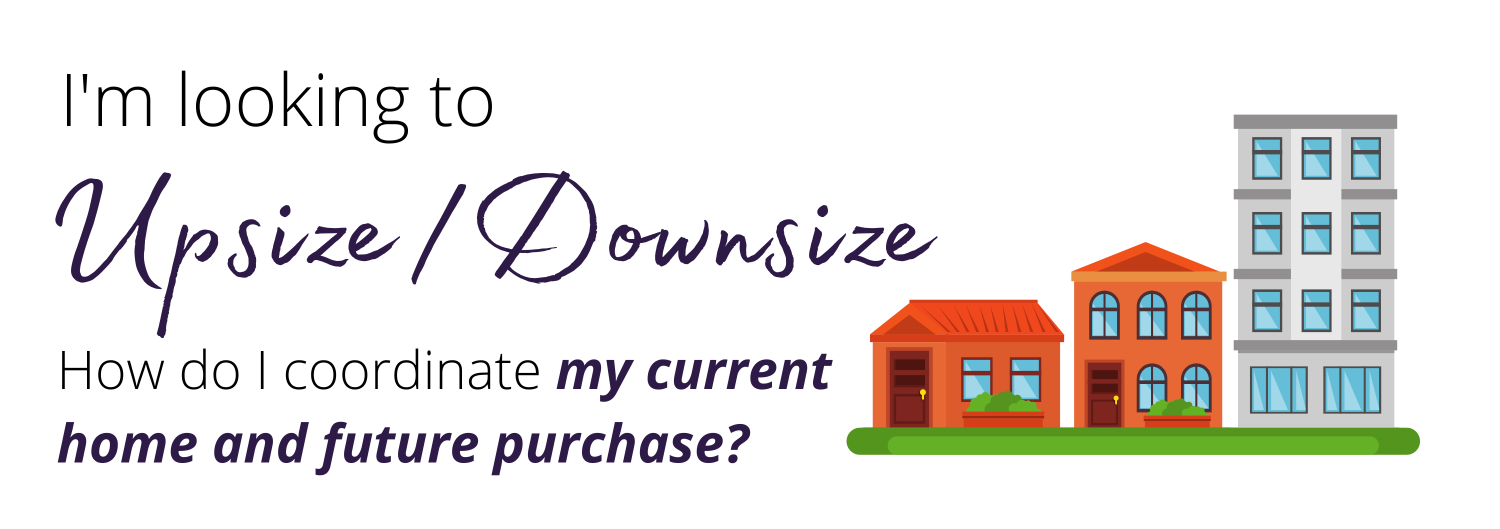Upsizing or Downsizing

I'm looking to
Upsize/Downsize
How do I coordinate
my current home and future purchase?
*ALL OPTIONS ARE RELIANT ON IF YOU CAN QUALIFY

*ALL OPTIONS ARE RELIANT ON IF YOU CAN QUALIFY
OPTION 1: SELLING NOW
If you plan to sell your current home and source your down payment for your new purchase from your sale proceeds, there are a couple of scenarios you may encounter:
If the dates DO line up...
This is the ideal scenario for most, where your sale closes before or on the same day as the closing date for your purchase, so your sale proceeds being used for down payment will simply be handled by your lawyer or notary.
Keep in mind, if you are porting your mortgage from your current home to the new property, your lender may have certain date restrictions (i.e. your sale cannot close more than 30 days before your purchase).
If the dates DON'T line up...
If you have a firm sale agreement (subject-free) on your current home, but it is closing after your purchase, bridge/interim financing may be an option. More info can be found on our "Bridge Financing" info sheet HERE.
OPTION 2: SELLING IN THE FUTURE
One of the primary considerations in this scenario is where your down payment will be sourced from. Do you need to access equity from your current home?
If yes, we can explore refinancing your current home, provided there is sufficient equity and you are able to qualify.
Depending on when you are planning to sell, we can work together on a strategy to meet your goals.
Keep in mind, even if your down payment will be sourced from elsewhere (savings or gifted from family), you will still need to account for any existing mortgage, property taxes, and other expenses, so this can make qualifying more of a challenge in some cases.
OPTION 3: KEEPING IT AS A RENTAL
As with Option 2, you'll need to consider in this scenario where your down payment will be sourced from.
We can look at refinancing your current home to access equity if needed for down payment, provided you are able to qualify for this. Using rental income (confirmed by a market rent appraisal) can help offset the expenses of the property. Keep in mind, lenders will only consider long-term rental income; they will not consider short-term rental income, even if you are legally able and plan to use the property this way.
You'll also want to consider whether the property will cashflow. If you are refinancing your home, we can look at extending the amortization out to 30 years to reduce the monthly payments as much as possible, however you will want to ensure you account for all potential costs (property taxes, insurance, strata fees if applicable, repairs, etc).
OTHER CONSIDERATIONS
Be sure to discuss with your accountant and lawyer to ensure you are aware of any potential tax and legal implications.
Keep in mind the closing costs for your purchase, including Property Transfer Tax (more information HERE) and real estate & legal fees if you are selling your home.
If you (and your spouse) are both over 55 and are looking to downsize, there may be other bridge/interim financing options also worth exploring.
OPTION 1: SELLING NOW
If you plan to sell your current home and source your down payment for your new purchase from your sale proceeds, there are a couple of scenarios you may encounter:
If the dates DO line up...
This is the ideal scenario for most, where your sale closes before or on the same day as the closing date for your purchase, so your sale proceeds being used for down payment will simply be handled by your lawyer or notary.
Keep in mind, if you are porting your mortgage from your current home to the new property, your lender may have certain date restrictions (i.e. your sale cannot close more than 30 days before your purchase).
If the dates DON'T line up...
If you have a firm sale agreement (subject-free) on your current home, but it is closing after your purchase, bridge/interim financing may be an option. More info can be found on our "Bridge Financing" info sheet
HERE.
OPTION 2: SELLING IN THE FUTURE
One of the primary considerations in this scenario is where your down payment will be sourced from. Do you need to access equity from your current home?
If yes, we can explore refinancing your current home, provided there is sufficient equity and you are able to qualify.
Depending on when you are planning to sell, we can work together on a strategy to meet your goals.
Keep in mind, even if your down payment will be sourced from elsewhere (savings or gifted from family), you will still need to account for any existing mortgage, property taxes, and other expenses, so this can make qualifying more of a challenge in some cases.
OPTION 3: KEEPING AS A RENTAL
As with Option 2, you'll need to consider in this scenario where your down payment will be sourced from.
We can look at refinancing your current home to access equity if needed for down payment, provided you are able to qualify for this. Using rental income (confirmed by a market rent appraisal) can help offset the expenses of the property. Keep in mind, lenders will only consider long-term rental income; they will not consider short-term rental income, even if you are legally able and plan to use the property this way.
You'll also want to consider
whether the property will cashflow. If you are refinancing your home, we can look at extending the amortization out to 30 years to reduce the monthly payments as much as possible, however you will want to ensure you account for all potential costs (property taxes, insurance, strata fees if applicable, repairs, etc).
OTHER CONSIDERATIONS
- Be sure to discuss with your accountant and lawyer to ensure you are aware of any potential tax and legal implications.
- Keep in mind the closing costs for your purchase, including Property Transfer Tax (more information HERE) and real estate & legal fees if you are selling your home.
- If you (and your spouse) are both over 55 and are looking to downsize, there may be other bridge/interim financing options also worth exploring.
CONTACT US
VISIT US
#13 - 327 Prideaux Street
Nanaimo, BC V9R 2N4
All Rights Reserved | The Collective Mortgage Group | Verico Mortgage Broker Network | OAC, E&O | Privacy and Content Policy


